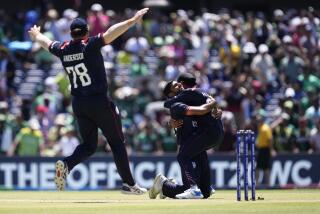A team only its country can love
- Share via
LONDON — We Americans tend to adore Australians -- the verve, the humor, the toughness, the Kidman -- and one way for Americans to continue adoring Australians would be for Americans to continue ignoring cricket.
It should be no problem.
The masses on this turbulent planet who value cricket, meanwhile, live under Australian rule, as the seemingly interminable 2007 World Cup reiterates.
The 2007 World Cup will, in a shocker, terminate, sometime late Saturday night in Barbados, just after the Australians defeat Sri Lanka, then pile into a victory scrum and become the first nation to accept a third straight World Cup trophy.
At least that’s the steadfast forecast of most cricket intellectuals, one of whom reportedly said, “I would be amazed if Australia didn’t win.” That would be John Howard, prime minister of Australia, and there’s nothing like the words of yammering nitwit politicians to ladle pressure on the actual heroes.
Thing is, Australian cricketers clearly can sustain it. They’re the New York Yankees/Manchester United/Wooden UCLA of World Cup cricket. They’re feared, admired, envied, resented, beloved (in Australia) and occasionally bemoaned, with some through the years claiming they do too much “sledging,” a term synonymous with, and superior to, the clunky American “trash talk.”
Even England might resent Australia if only it paid much attention to anything other than soccer.
As a country of 21 million people, Australia has a hardy sports history, and routinely gets excellent Summer Olympics marks in the all-important category of medals per capita.
The Australians have gone 28 straight World Cup matches without losing, having drawn with South Africa in a 1999 semifinal. The Australians last lost in a World Cup on May 23, 1999, in Leeds, England, against Pakistan, by 10 runs, and they’ve beaten 14 different countries since, including fellow cricket royalty Sri Lanka (three times), India (twice), Pakistan (twice), South Africa (twice), New Zealand (twice) and England (twice.)
It’s no wonder that in August 2005 when England won the Ashes trophy from Australia in that historic, biennial, two-nation series, England conducted an exultation, held a parade and used it as an excuse to drink heavily.
As Kevin Mitchell of the Observer in England wrote from Australia during the ensuing Ashes, which Australia dominated in December 2006, “Cricket at club level in England is still largely something to do on a summer’s day; in Australia, it resembles a rumbling war, physically and mentally ratcheted up to health-threatening levels.”
The Australians arrived at the opening ceremonies of the 2007 World Cup in Jamaica as a slight enigma. They’d lost five matches of milder significance in between the Ashes and the Caribbean. A distant memory seems to indicate that South Africa -- mauled by Australia in a semifinal -- held No. 1 in the world rankings at the time, with the Australians No. 2.
Well, they proceeded to tear through 10 matches like a matchless scythe, winning by 203 runs, 209 runs, 83 runs, 103 runs, 10 wickets, seven wickets, nine wickets, seven wickets, 215 runs and seven wickets, all of which apparently are decisive.
And all with, reportedly, not as much sledging as last time.
Sledging in cricket means hurling insults while hoping to disrupt an opponent’s concentration, and Australians have stated a desire to temper the sledging that often has adjoined their reputation. Glenn McGrath, the 37-year-old cricketer who’ll retire after the final, said he hoped to be remembered for something other than sledging, as most of us do.
Sledging does have a lush and lurid history, sometimes involving barbs either salacious or downright cruel. In a tame instance that turns up on a BBC famous-sledging list, a Pakistani player supposedly once referred to Australian sledging maestro Merv Hughes as a “fat bus conductor,” whereupon Hughes bowled him out and said, “Tickets, please!” In instances both rife and far less tame, sledging seems to focus on opposing players’ wives.
When people refer to sledging, they often peg it as part of the intimidating game of the Australian dynasty (1999-2007 and counting).
Into this path walks Sri Lanka, which beat Australia in the 1995 final, has staged a marvelous 2007 tournament and bested New Zealand in a semifinal to ward off an all-Oceania final. Just about everyone expects it to become victim No. 23, an outcome that would give Australians unprecedented off-the-field sledging rights.
